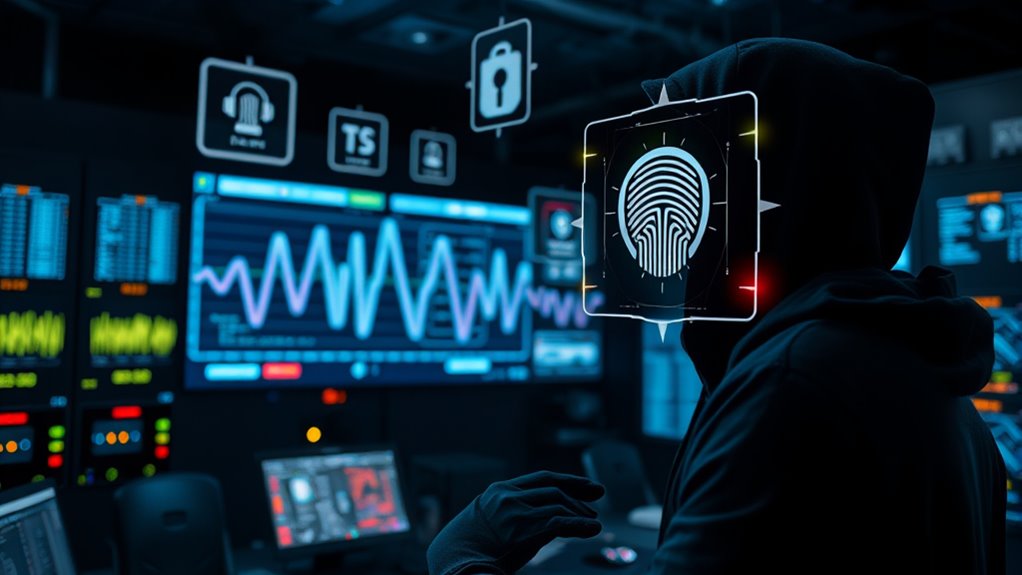AI voice cloning scams are surging, making it easier for malicious actors to create convincing audio impersonations that can deceive you and your organization. These scams can lead to financial loss, identity theft, or emotional distress, forcing security experts to implement new defenses like voice verification and AI detection tools. Staying aware of these threats and understanding how to spot them is essential. Continue exploring to learn more about how you can protect yourself from these evolving scams.
Key Takeaways
- The rise of AI voice cloning enables convincing scams like fake kidnapping calls and financial frauds.
- Increasing accessibility of cloning tools allows malicious actors to generate realistic voices from minimal samples.
- Traditional security measures struggle against AI-generated voices, prompting adoption of voice biometrics and multi-factor authentication.
- Organizations and individuals are implementing verification protocols and awareness campaigns to prevent scams.
- Ongoing advancements in detection technology are essential to counter sophisticated voice impersonation schemes.

As AI technology advances, voice cloning scams have become an increasingly urgent threat. You might not realize how easily someone can manipulate digital deception to impersonate your voice or that of someone you trust. Voice impersonation, powered by sophisticated AI algorithms, now makes it possible for malicious actors to recreate voices with startling accuracy. This means scammers can produce convincing audio clips that sound just like a loved one, a boss, or a colleague, making their scams more believable and harder to detect. The danger lies in how seamlessly these cloned voices can deceive, leading to financial loss, identity theft, or severe emotional distress for unsuspecting victims.
AI voice cloning makes scams more convincing and harder to detect, risking financial loss and emotional distress.
You need to understand that these voice impersonation tools are more accessible than ever. Criminals can generate a convincing voice clone with just a few minutes of audio recordings, often obtained from social media, interviews, or leaked recordings. Once they have a decent sample, they can produce new utterances that sound exactly like the original person, making digital deception highly effective. This technology has been exploited in various scams, such as fake kidnapping calls, fraudulent bank requests, or corporate impersonations, where the scammer’s voice convinces the target to act impulsively. The use of AI in creating these voice clones raises the stakes, as it becomes increasingly difficult to distinguish between genuine and fabricated audio. Moreover, the evolving nature of ethical hacking techniques means that security measures must also adapt to counter new threats. Additionally, the proliferation of resources and tools makes it easier for malicious actors to develop and deploy these scams rapidly. Recognizing the importance of voice biometrics is crucial in creating more resilient security protocols against these threats. Staying informed about emerging security technologies can help prevent falling victim to such scams. Furthermore, ongoing research into detection methods is vital to stay ahead of increasingly sophisticated voice cloning technologies.
The rise of these scams has prompted organizations and individuals to adopt new security measures. Voice biometrics, multi-factor authentication, and voice verification systems are now being integrated to counteract the threat. But it’s a constant game of cat and mouse—scammers are continually refining their methods, using advanced AI to bypass traditional security checks. You should be cautious about unsolicited calls or messages that request sensitive information or urgent actions, especially if the voice sounds familiar but seems slightly off. Always verify requests through a secondary channel before acting on them. Companies are also investing in AI-driven detection tools that analyze subtle cues, like voice modulation or background noise, to identify cloned voices.
While technology is empowering scammers, it’s also giving security professionals new ways to fight back. Awareness is your best defense. Recognize that digital deception is more prevalent than ever, and don’t take voice communications at face value. Always verify identities through trusted channels, especially when sensitive information or money is involved. As AI continues to evolve, so must your vigilance and your understanding of the risks posed by voice impersonation. Staying informed and cautious can help you stay one step ahead of the scammers exploiting these powerful tools for their malicious gains.
Frequently Asked Questions
How Can Individuals Verify the Authenticity of Voice Communications?
To verify the authenticity of voice communications, you should use voice verification and caller authentication techniques. Always listen carefully for inconsistencies or suspicious tones. Ask for information only the real caller would know, and consider using secure verification apps or services that confirm caller identities. If in doubt, hang up and call back through official channels. These steps help guarantee you’re engaging with legitimate sources and protect yourself from scams.
Are There Legal Penalties for Creating Deepfake Voice Content?
You might wonder if creating deepfake voice content has legal penalties. Yes, there are legal ramifications, including criminal penalties, for maliciously producing deepfake voices. Laws vary by jurisdiction, but generally, unauthorized use of someone’s voice can lead to charges like fraud or defamation. You should understand that using deepfakes irresponsibly can result in serious consequences, so always consider the legal implications before creating or sharing such content.
What Industries Are Most Targeted by Voice Cloning Scams?
You should know that industries targeted by voice cloning scams include banking and entertainment. Scammers often use cloned voices for bank fraud, tricking you into revealing sensitive info. Celebrity impersonation is also common, where scammers mimic famous voices to gain trust or spread misinformation. Stay alert and skeptical of unexpected calls, especially if they request personal details or money, because these scams can be convincing and damaging.
Can Existing Security Systems Detect Ai-Generated Voice Impersonations?
Imagine trying to spot a chameleon in a jungle—tricky, right? Existing security systems use voice recognition and biometric verification, but AI-generated impersonations can sometimes slip through. While some advanced systems detect subtle inconsistencies, many still struggle with perfect cloning. You should stay cautious, as scammers evolve, making it essential for security measures to keep pace with AI tech to protect your identity effectively.
How Effective Are Current AI Detection Tools Against Voice Cloning?
You might wonder how effective current AI detection tools are at verifying voice authenticity and preventing fraud. These tools analyze subtle cues in speech patterns to spot AI-generated voices, but scammers constantly improve their cloning techniques. While they offer a layer of fraud prevention, they aren’t foolproof yet. You should stay cautious and combine multiple security measures to guarantee your voice-based interactions remain secure against sophisticated impersonations.
Conclusion
As you navigate this brave new world, staying vigilant is your best defense. Just like the watchmen of old guarded their gates, you must protect your digital identity from evolving AI voice scams. Remember, no matter how convincing a voice sounds, always verify before trusting. In this age of technological wizardry, don’t let cybercriminals turn your trust into a Trojan horse. Stay alert, stay safe, and don’t let AI’s magic turn into your downfall.









